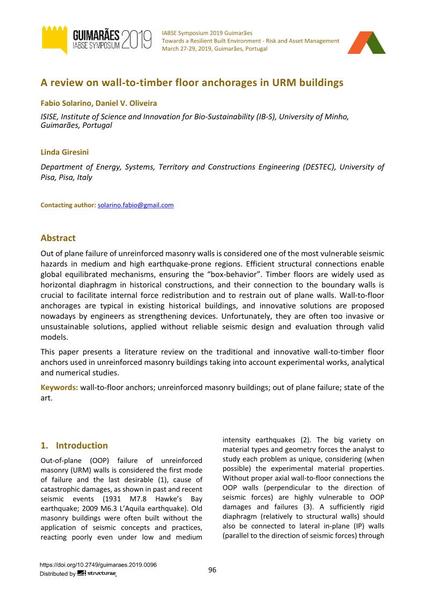A review on wall-to-timber floor anchorages in URM buildings

|
|
|||||||||||
Bibliografische Angaben
| Autor(en): |
Fabio Solarino
(ISISE, Institute of Science and Innovation for Bio-Sustainability (IB-S), University of Minho, Guimarães, Portugal)
Daniel V. Oliveira (ISISE, Institute of Science and Innovation for Bio-Sustainability (IB-S), University of Minho, Guimarães, Portugal) Linda Giresini (Department of Energy, Systems, Territory and Constructions Engineering (DESTEC), University of Pisa, Pisa, Italy) |
||||
|---|---|---|---|---|---|
| Medium: | Tagungsbeitrag | ||||
| Sprache(n): | Englisch | ||||
| Tagung: | IABSE Symposium: Towards a Resilient Built Environment Risk and Asset Management, Guimarães, Portugal, 27-29 March 2019 | ||||
| Veröffentlicht in: | IABSE Symposium Guimarães 2019 | ||||
|
|||||
| Seite(n): | 96-106 | ||||
| Anzahl der Seiten (im PDF): | 11 | ||||
| DOI: | 10.2749/guimaraes.2019.0096 | ||||
| Abstrakt: |
Out of plane failure of unreinforced masonry walls is considered one of the most vulnerable seismic hazards in medium and high earthquake-prone regions. Efficient structural connections enable global equilibrated mechanisms, ensuring the “box-behavior”. Timber floors are widely used as horizontal diaphragm in historical constructions, and their connection to the boundary walls is crucial to facilitate internal force redistribution and to restrain out of plane walls. Wall-to-floor anchorages are typical in existing historical buildings, and innovative solutions are proposed nowadays by engineers as strengthening devices. Unfortunately, they are often too invasive or unsustainable solutions, applied without reliable seismic design and evaluation through valid models. This paper presents a literature review on the traditional and innovative wall-to-timber floor anchors used in unreinforced masonry buildings taking into account experimental works, analytical and numerical studies. |
||||
| Stichwörter: |
Stand der Technik
|
||||
